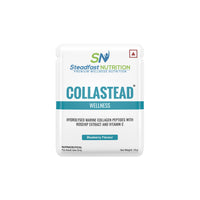Table of Content
Collagen, the most abundant fibrous protein in the body, is used to make connective tissues that provide structure and strength to the body. Collagen helps keep cells and tissues together, supporting skin, nails, hair, joint and bone health. It’s naturally produced by the body, but after a certain age, production diminishes due to several factors, including age, diet, stress, lifestyle and genetics. Collagen levels alter in your 20s, 30s, and 40s, which is when one can consider taking collagen supplements to maintain skin elasticity, hair strength and joint flexibility. Read on to learn about when to start taking collagen and how these supplements can be the finest addition to your beauty regimen.
What is Collagen, and why does it matter?
It is a naturally synthesised protein that contains amino acids. Most importantly, collagen gives structural support to tissues, maintaining elasticity and rigidity. It is an essential component of tendons, ligaments, and the skin. Hence, it can be said that it forms a network of collagen molecules that helps hold the body’s tissues together.
Collagen loss with age:
- In your 20s: At this stage, collagen production is normal and initially increases until the mid 20s. However, it starts to decline slightly as you reach your late 20s, especially if you have poor dietary and lifestyle patterns.
- In your 30s: Collagen loss accelerates at this stage of life, with skin ageing becoming a little visible.
- In your 40s: Natural production of collagen and elastin drops dramatically in the 40s, leading to more pronounced skin wrinkles and joint discomfort.
External factors that speed up Collagen depletion:
Lifestyle modifications can reduce the rate at which collagen depletes in your body. It is best to avoid certain bad habits and overexposure to the sun.
Smoking
Smoking reduces collagen production, slows wound healing and causes wrinkles by damaging collagen and elastin. Smoking also leads to the narrowing of blood vessels, reducing nutrient supply to skin cells and may inhibit collagen production.
Poor dietary pattern:
What we eat plays a critical role in collagen production at every stage of life. Having excessive refined carbohydrates and sugars damages protein molecules, impacting collagen production and resulting in poor skin, bone, joint, and ligament health.
Overexposure to ultraviolet light:
Ultraviolet light causes wrinkles, as increased sunlight and UV ray exposure decrease collagen production and damage the collagen molecules, causing photoaging. Therefore, avoid excessive sun exposure and use sunscreen when you’re outside.
Collagen in your 20s
When you're in your 20s, your body produces normal to high amounts of collagen. But in the late 20s, collagen production declines slightly. The early signs are often subtle.
What happens
-
Collagen production/synthesis starts to drop minimally in the late 20s, with stress, sun exposure, poor diet, and lifestyle factors speeding up collagen loss.
Signs of low Collagen could be
- Emergence of wrinkled and saggy skin: Loss of collagen leads to fine lines and loose skin.
- Skin dullness and dryness: Collagen depletion causes skin dullness and dryness.
- Brittle hair and nails: Weak and thin hair and premature greying, increase chances of hair breakage.
- Joint pain: Collagen supports the cartilage and bones. Low collagen levels can cause joint discomfort and stiffness, and make bones fragile, increasing the chances of bone fractures.
- Delayed wound healing: Low levels of collagen delay wound healing due to slow tissue repair.
- Loss of Muscle mass: Collagen supports muscle structure by providing elasticity, strengthening muscles, and alleviating muscle wasting.
Why start taking Collagen in your 20s?
It would be a proactive approach to start consuming collagen-boosting foods and supplements at an early age. If you are already facing issues like poor skin quality along with bone and joint health issues, it could be the signs of diminished collagen production and can be dealt with by incorporating collagen-boosting food sources and dietary collagen supplements and following a healthy lifestyle.
Collagen in your 30s
Collagen in your 30s begins to decrease by around 1% per year — the skin starts getting dehydrated, drier, and sags, showing wrinkles. It also loses its elasticity. To enhance collagen synthesis at this stage, you can have vitamin C, zinc and protein-rich foods as per their requirement. Additionally, you can also opt for a high-quality supplement to meet your collagen needs in your 30s.
Collagen for skin aging:
The 30s are marked by a dip in collagen levels, affecting skin. Supplementing in your 30s can help slow the breakdown of existing collagen while encouraging new production. Studies show that type 1 hydrolysed collagen can improve skin elasticity, hydration, and reduce the depth of wrinkles when taken consistently.
Collagen in your 40s
By the time you reach your 40s, the signs of skin ageing become more pronounced with the appearance of wrinkles, spots, fine lines, loss of skin integrity and lacklustre skin. Premature ageing signs like age spots, skin hyperpigmentation, and a change in skin tone may also develop due to reduced collagen production. Following the right skincare routine may help address skin issues caused by reduced collagen levels. As you know, collagen is an uncommon protein that makes your skin, hair, and nails look astounding. To enhance collagen production, include collagen-boosting nutrients in your diet, such as protein, zinc, and vitamin C.
Why is Collagen crucial?
Collagen in your 40s is not just preventive; it's essential because during this period, collagen production significantly declines, affecting joints, ligaments, and, most importantly, the skin. For this reason, it becomes crucial to add good-quality collagen supplements to fulfil its need. For best results, combine supplements with a targeted skincare routine and collagen-rich foods. This is also the time to be consistent and patient, since while results take time, long-term benefits are worth it.
Best sources of Collagen
You can meet your collagen requirements both through foods and supplements. Here’s how:
Foods high in Collagen
- Bone Broth: Usually high in type 1 collagen, bone broth is made by simmering animal bones in water, which releases collagen into the broth.
- Chicken: Not only chicken bones, but chicken skin is also a good source of type 1 and 3 collagen, which have a good amino acid composition.
- Fish: Fatty fish like salmon and sardines usually contain marine collagen, found in their skin, scales and bones. It is easily digested and absorbed.
- Gelatin: Gelatin is a form of collagen that breaks down the connective tissues present in animal skin and cartilage, making them rich in collagen.
- Egg whites – Though they are not directly rich in collagen, egg whites are packed with proline that promotes collagen production in the body.
- Citrus fruits – Citrus fruits are loaded with vitamin C content and antioxidants that help maintain clear skin. The ascorbic acid present helps in collagen synthesis.
Collagen supplements
There are mainly 3 types of collagen supplements, each having varied benefits:
- Hydrolysed collagen peptides – Collagen is hydrolysed into collagen peptides, which are easily absorbed by the body. It is the most effective form of collagen.
- Marine collagen – Great for skin, ligaments, and joints and is sourced from marine sources.
- Bovine collagen – Supports joint and skin health and is mainly extracted from cow hides.
Tips to boost Collagen absorption
- Have vitamin C-rich foods
- Avoid smoking and alcohol
- Avoid excessive intake of processed and sugary foods
- Maintain proper hydration
- Get proper sleep to reduce stress
- Avoid excessive sun exposure
Additionally, the amino acids proline and glycine present in protein-rich sources and nutrients like zinc and vitamin C also support collagen synthesis.
When to start taking Collagen?
To boost collagen production, make sure to include supporting nutrients in your diet. Foods rich in vitamin C and antioxidants should be a regular part of your meals, irrespective of your age. When it comes to supplements, the best time to start taking them is in the late 20s or early 30s, when collagen levels begin to decline. Individuals with joint pain, dry and wrinkled skin, and bone problems can start taking a collagen supplement under the advice of a medical professional. In your 40s, collagen becomes crucial for preserving bone health and reducing the signs of ageing. Collagen production naturally declines in your 40s, resulting in sagging skin, more obvious wrinkles, and stiff joints. You can support your body's natural collagen production with collagen supplements at any time to counteract these effects.
Final thoughts
The way we look is greatly influenced by collagen. Knowing your body's evolving collagen requirements can help you anticipate the changes in your body and take the appropriate action at the right time, regardless of your age. As long as you choose a high-quality product and maintain consistency, collagen supplements are a safe and effective way to support healthy skin, joints, and vitality.
FAQ
1. Which type of Collagen is best for skin?
Hydrolysed Type I marine collagen is best for improving skin elasticity and reducing wrinkles, as it is easily digested and absorbed by the body.
2. Can I take Collagen every day?
Yes. Daily collagen supplementation is safe and more effective when taken consistently as per the recommended dosage.
3. How long does it take to see results from Collagen?
Collagen works slowly. However, visible improvements may be seen in the first 6–12 weeks, with improved skin hydration, elasticity, and fewer fine lines and wrinkles.
4. What are the early signs of Collagen loss?
Subtle skin dullness, reduced elasticity, slower workout recovery, and early signs of wrinkles or dryness can be early indicators of a decline in collagen production.


